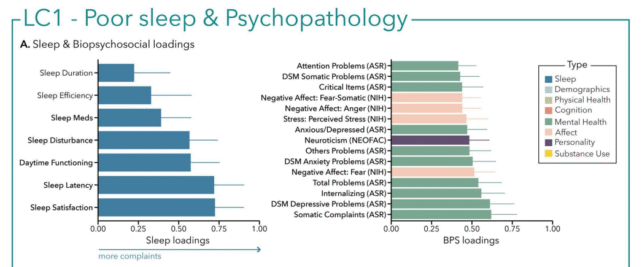A team of scientists has identified five different sleep profiles that link the quality of a person’s shut-eye with a variety of health, psychological, and lifestyle outcomes.
Although it’s something we all do frequently, the science of sleep is still pretty murky.
For the new study, the scientists examined multiple aspects of sleep quality and how they related to a variety of outcomes.
Related: Massive Study Links 6 Sleep Traits to Risk of 172 Diseases
They analyzed information on 770 healthy young adults collected through the Human Connectome Project, which includes brain imaging data as well as patient-reported sleep, health, and lifestyle characteristics.
With all this together, the team identified five distinct sleep-biopsychosocial profiles that show unique patterns of brain network organization.
The first profile links poor sleep with negative mental health outcomes. Patients fitting this profile showed a range of sleep problems, particularly taking longer to fall asleep at night and being less satisfied with their sleep overall. They expressed higher depression, anxiety, stress, fear, and anger problems.

People in the second profile presented no major sleep problems, but still had mental health issues, including higher ADHD, anger, stress, fear, and sadness, and lower conscientiousness. For patients in this group, their issues likely stem from other causes.
The third profile was defined largely by the use of sleep aid medications. People in this group demonstrated greater conscientiousness and reported feeling more satisfied in their friendships and emotional support networks. However, they also showed increased cognitive problems with visual episodic memory, fluid intelligence, and spatial orientation.
Profile number four was mostly linked to sleep duration, with fewer hours of rest associated with more aggressive behavior and difficulty with emotional processing, language, and fluid intelligence.
Finally, the fifth profile was driven largely by sleep disturbances, waking frequently during the night. These patients also exhibited aggressive behavior and similar cognitive issues as profile four, but were also more likely to have thought problems, anxiety, high blood pressure, be smokers, and show symptoms of alcohol dependence.
“The different sleep profiles were also supported by unique patterns of brain function measured with MRI, suggesting that sleep experiences are reflected not just in health and behavior, but also in the brain’s wiring and activity,” says Aurore Perrault, neuroscientist at Concordia University in Canada.
While sleep has been extensively studied, most studies examine single factors in isolation, correlating with single outcomes. The team hopes that by looking at a wider range of associations and understanding which of the five profiles best describes each patient, doctors may better diagnose and treat sleep disorders and related health problems.
After all, research is constantly revealing new ways that sleep is linked with our wellbeing. Too little is unhealthy in a variety of ways – but so is too much.
That said, hours aren’t a good measure alone: some people naturally need more or less than others. Instead, it’s about the quality, and that’s affected in various ways by how, where, who with, and when you sleep.
It’s enough to keep you up at night.
The new work was published in the journal PLOS Biology.
Source link


